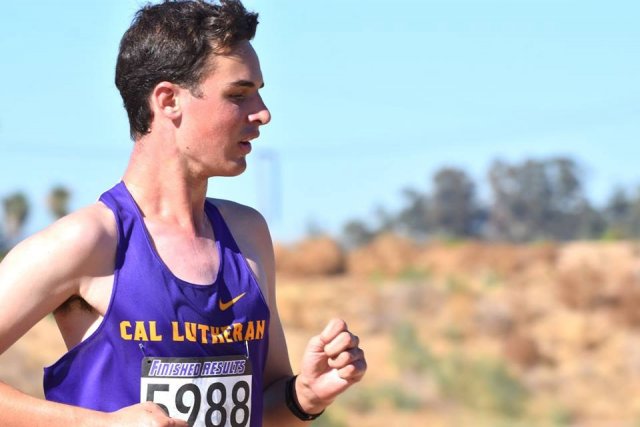Book gives voice to 10 autistic authors
International group of writers includes local residents

Dillan Barmache runs cross-country for Cal Lutheran because it helps him feel in control of his body.
Photo: Sandra Dubois(THOUSAND OAKS, Calif. – Oct. 1, 2019) Ten nonspeaking people with autism explain how they found their voices through alternative communication methods in a new book edited by the director of the Autism and Communication Center at California Lutheran University.
The authors of “Communication Alternatives in Autism: Perspectives on Typing and Spelling Approaches for the Nonspeaking” include Cal Lutheran student Dillan Barmache of Woodland Hills; California State University, Channel Islands, student Samuel Capozzi of Thousand Oaks; and Ido Kedar of Woodland Hills. The other contributors are Larry Bissonnette and Tracy Thresher of Vermont, Henry Frost and Amy Sequenzia of Florida, Philip Reyes and Emma Zurcher-Long of New York and Rhema Russell of Warsaw, Poland.
The book’s publication will be celebrated Saturday, Oct. 5, at the fourth annual Spectrum of Opportunity conference at Cal Lutheran. Editor Edlyn Peña of Camarillo and eight of the authors will share strategies highlighted in the book with more than 300 autistic self-advocates, family members, educators and professionals.
“Imagine, after decades of silence, discovering your voice without being able to speak,” said Peña, whose son has autism. “Their narratives document the complexities that autistic individuals navigate when choosing to use a highly controversial, alternative form of communication in educational community settings.”
In the book, Thresher, Bissonnette and Sequenzia document their limited opportunities at a time when autistic children were institutionalized and their discoveries as adults of ways to communicate. Chapters by Barmache, Capozzi and Kedar reflect the experiences of a generation of people with autism who had access to full educational inclusion by the time they reached high school and college, but who still faced challenges. The other authors had a range of schooling experiences.
Like many of the authors, Barmache describes the frustration of being stuck repeating lessons that were far too easy because he couldn’t indicate his understanding in his voice or gestures. Later, with the help of a new teacher, he began spelling out words and was able to show what he understood. He moved into more advanced classes and gave a speech at his eighth-grade graduation by typing it into a tablet and letting the computer’s voice speak for him. Now he is in his second year at Cal Lutheran, majoring in psychology. He also runs cross-country because it helps him feel in control of his body. He has received awards for sharing his experiences at schools and conferences and through his blog.
“I am so ready to let the world know that they are all wrong about autism,” Barmache writes in the book. “There are so many of us, and it’s time to listen to our message, include us in all of the decisions that must be made, and share our thoughts with the people who are there to support us in our lives.”
More
- Book gives voice to 10 autistic authors
Tue October 1, 2019Ten nonspeaking people with autism explain how they found their voices through alternative communication methods in a new book edited by the director of the Autism and Communication Center at California Lutheran University.
- Int'l admissions director honored for work
Fri July 26, 2019California Lutheran University’s director of international admission received the Distinguished Service Award from the International Association for College Admission Counseling (IACAC).
- Expert examines college retention for men
Thu July 25, 2019A California Lutheran University faculty member co-authored a just-released book on addressing the difficulties that men from underrepresented groups encounter in college, and he will discuss the topic during a livestreamed interview next week.
- First-generation graduates to keynote
Thu May 9, 2019Two first-generation college students who found their career paths as undergraduates at California Lutheran University will speak on behalf of more than 500 people picking up advanced degrees at the 2019 Graduate Commencement on Friday, May 17.
- Students to assist with YMCA summer achievement program
Fri March 22, 2019For the second year, California Lutheran University graduate students will earn hands-on teaching experience at the Southeast Ventura County YMCA's free five-week achievement gap program for low- and moderate-income students who are not reading at grade level.
- Alumni Spotlight: Melanie Carlisle
Tue March 12, 2019 - Diane Rodriguez-Kiino, Lydia Chung '18 M.S. and Brook Masters '18 M.S. were accepted to present their first research proposal, "Academic Mindset Development: A Framework for Underrepresented Student Success"
Tue March 12, 2019 - Dan Tillapaugh - Publications
Tue March 12, 2019 - Dan Tillapaugh - Publications
Tue March 12, 2019 - Hack-a-thon to seek autism solutions
Fri March 1, 2019Teams will compete to design the most creative solutions to challenges faced by people on the autism spectrum during a free event at California Lutheran University.